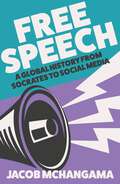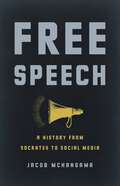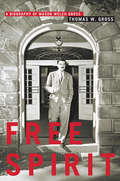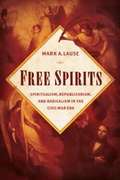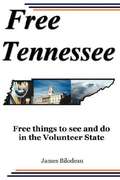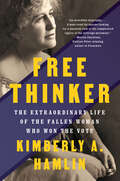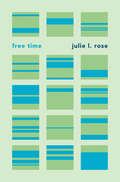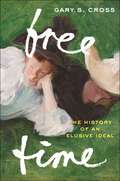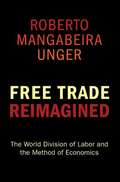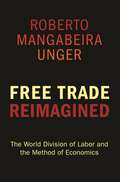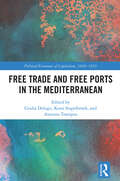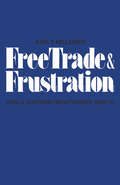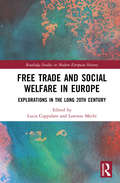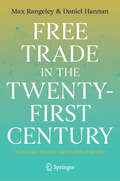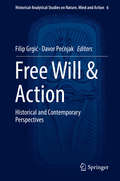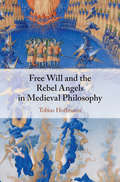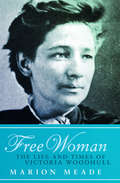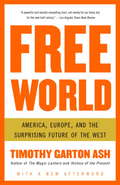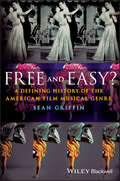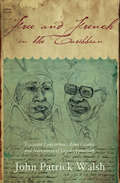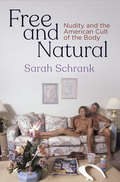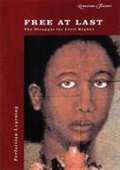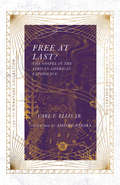- Table View
- List View
Free Speech: A Global History from Socrates to Social Media
by Jacob MchangamaA global history of free speech, from the ancient world to today.Hailed as the "first freedom," free speech is the bedrock of democracy. But it is a challenging principle, subject to erosion in times of upheaval. Today, in democracies and authoritarian states around the world, it is on the retreat.In Free Speech, Jacob Mchangama traces the riveting legal, political, and cultural history of this idea. Through captivating stories of free speech's many defenders - from the ancient Athenian orator Demosthenes and the ninth-century freethinker al-Razi, to Mary Wollstonecraft, Mahatma Gandhi, Nelson Mandela and modern-day digital activists - Mchangama demonstrates how the free exchange of ideas underlies all intellectual achievement and has enabled the advancement of both freedom and equality worldwide. Yet the desire to restrict speech is also a constant, and he explores how even its champions can be led down this path when the rise of new and contrarian voices challenge power and privilege of all kinds.Meticulously researched, deeply humane and provocative, Free Speech challenges us all to recognise how much we have gained from this principle - and how much we stand to lose without it.
Free Speech: A Global History from Socrates to Social Media
by Jacob MchangamaA global history of free speech, from the ancient world to today.Hailed as the "first freedom," free speech is the bedrock of democracy. But it is a challenging principle, subject to erosion in times of upheaval. Today, in democracies and authoritarian states around the world, it is on the retreat.In Free Speech, Jacob Mchangama traces the riveting legal, political, and cultural history of this idea. Through captivating stories of free speech's many defenders - from the ancient Athenian orator Demosthenes and the ninth-century freethinker al-Razi, to Mary Wollstonecraft, Mahatma Gandhi, Nelson Mandela and modern-day digital activists - Mchangama demonstrates how the free exchange of ideas underlies all intellectual achievement and has enabled the advancement of both freedom and equality worldwide. Yet the desire to restrict speech is also a constant, and he explores how even its champions can be led down this path when the rise of new and contrarian voices challenge power and privilege of all kinds.Meticulously researched, deeply humane and provocative, Free Speech challenges us all to recognise how much we have gained from this principle - and how much we stand to lose without it.(P) 2022 Hodder & Stoughton Limited
Free Speech: A History from Socrates to Social Media
by Jacob Mchangama&“The best history of free speech ever written and the best defense of free speech ever made.&” —P.J. O&’RourkeHailed as the &“first freedom,&” free speech is the bedrock of democracy. But it is a challenging principle, subject to erosion in times of upheaval. Today, in democracies and authoritarian states around the world, it is on the retreat.In Free Speech, Jacob Mchangama traces the riveting legal, political, and cultural history of this idea. Through captivating stories of free speech&’s many defenders—from the ancient Athenian orator Demosthenes and the ninth-century freethinker al-Rāzī, to the anti-lynching crusader Ida B. Wells and modern-day digital activists—Mchangama reveals how the free exchange of ideas underlies all intellectual achievement and has enabled the advancement of both freedom and equality worldwide. Yet the desire to restrict speech, too, is a constant, and he explores how even its champions can be led down this path when the rise of new and contrarian voices challenge power and privilege of all stripes.Meticulously researched and deeply humane, Free Speech demonstrates how much we have gained from this principle—and how much we stand to lose without it.
Free Spirit: A Biography of Mason Welch Gross
by Thomas W. GrossThe Mason Gross School of the Arts in New Brunswick, New Jersey, stands as a memorial to one of Rutgers University’s most influential leaders. Gross started teaching at Rutgers as an assistant professor of philosophy in 1946, but quickly rose through the ranks to become the university’s provost in 1949 and finally its president from 1959 to 1971. He led the university through an era when it experienced both some of its greatest growth and most intense controversies. Free Spirit explores how Gross helped reshape Rutgers from a sleepy college into a world-renowned public research university. It also reveals how he steered the university through the tumult of the Red Scare, civil rights era, and the Vietnam War by taking principled stands in favor of both racial equality and academic freedom. This biography tells the story of how, from an early age, Gross came to believe in the importance of doing what was right, even when the backlash took a toll on his own health. Written by his youngest son Thomas, this book offers a uniquely well-rounded portrait of Gross as both a public figure and a private person. Covering everything from his service in World War II to his stints as a game-show personality, Free Spirit introduces the reader to a remarkable academic leader.
Free Spirits: Spiritualism, Republicanism, and Radicalism in the Civil War Era
by Mark A. LauseOften dismissed as a nineteenth-century curiosity, spiritualism influenced the radical social and political movements of its time. Believers filled the ranks of the Free Democrats, agitated for land and monetary reform, fought for abolition, and held egalitarian leanings that found powerful expression in campaigns for gender and racial equality. In Free Spirits , Mark A. Lause considers spiritualism as a political and cultural force in Civil War-era America. Lause reveals the scope, spread, and influence of the movement, both in its links to reformist causes and its ability to amplify previously marginalized voices. Rooting spiritualism's appeal in the crises of the time, Lause considers how spiritualist influences, through the distillation of the war, forced reassessments of the question of Radical Republicanism and radicalism in general. He also delves into unexplored areas such as the movement's role in Lincoln's reelection and the relationship between Native Americans and spiritualists.
Free Tennessee: Free Things to See and Do in the Volunteer State
by James V. Bilodeau[From the back cover] Free Tennessee Even in this day and age of super corporations, world trade, stock market gambles, and a general preoccupation for wealth - many things are still free. Tourism today is a multi-billion dollar industry, which is growing at a rapid pace. Mega-amusement parks, roadside attractions, and adventures pop up across the countryside daily. Most of the increase in the number of attractions is for-profit ventures, but even in the booming for profit tourism industry there are many opportunities for free entertainment. Free Tennessee will guide you to the best no cost attractions in Tennessee. Not simply a guidebook, Free Tennessee also tells the history about some of the most interesting attractions within the state.
Free Thinker: Sex, Suffrage, And The Extraordinary Life Of Helen Hamilton Gardener
by Kimberly A. HamlinA story of transgression in the face of religious ideology, a sexist scientific establishment, and political resistance to securing women’s right to vote. When Ohio newspapers published the story of Alice Chenoweth’s affair with a married man, she changed her name to Helen Hamilton Gardener, moved to New York, and devoted her life to championing women’s rights and decrying the sexual double standard. She published seven books and countless essays, hobnobbed with the most interesting thinkers of her era, and was celebrated for her audacious ideas and keen wit. Opposed to piety, temperance, and conventional thinking, Gardener eventually settled in Washington, D.C., where her tireless work proved, according to her colleague Maud Wood Park, "the most potent factor" in the passage of the Nineteenth Amendment. Free Thinker is the first biography of Helen Hamilton Gardener, who died as the highest-ranking woman in federal government and a national symbol of female citizenship. Hamlin exposes the racism that underpinned the women’s suffrage movement and the contradictions of Gardener’s politics. Her life sheds new light on why it was not until the passage of the 1965 Voting Rights Act that the Nineteenth Amendment became a reality for all women. Celebrated in her own time but lost to history in ours, Gardener was hailed as the "Harriet Beecher Stowe of Fallen Women." Free Thinker is the story of a woman whose struggles, both personal and political, resound in today’s fight for gender and sexual equity.
Free Time
by Julie L. RoseRecent debates about inequality have focused almost exclusively on the distribution of wealth and disparities in income, but little notice has been paid to the distribution of free time. Free time is commonly assumed to be a matter of personal preference, a good that one chooses to have more or less of. Even if there is unequal access to free time, the cause and solution are presumed to lie with the resources of income and wealth. In Free Time, Julie Rose argues that these views are fundamentally mistaken. First, Rose contends that free time is a resource, like money, that one needs in order to pursue chosen ends. Further, realizing a just distribution of income and wealth is not sufficient to ensure a fair distribution of free time. Because of this, anyone concerned with distributive justice must attend to the distribution of free time.On the basis of widely held liberal principles, Rose explains why citizens are entitled to free time--time not committed to meeting life's necessities and instead available for chosen pursuits. The novel argument that the just society must guarantee all citizens their fair share of free time provides principled grounds to address critical policy choices, including work hours regulations, Sunday closing laws, public support for caregiving, and the pursuit of economic growth. Delving into an original topic that touches everyone, Free Time demonstrates why all citizens have, in the words of early labor reformers, a right to "hours for what we will."
Free Time: The History of an Elusive Ideal
by Gary S. Cross2024 Outstanding Academic Title, given by Choice ReviewsThe history of leisure time, from the earliest societies to the work-from-home eraFree time, one of life’s most precious things, often feels unfulfilling. But why? And how did leisure activities transition from strolling in the park for hours to “doomscrolling” on social media for thirty minutes?Today, despite the promise of modern industrialization, many people experience both a scarcity of free time and a disappointment in it. Free Time offers a broad historical explanation of why our affluent society does not afford more time away from work and why that time is often unsatisfying. Gary S. Cross explores the cultural, social, economic, and political history, especially of the past 250 years to understand the roots of our conceptions of free time and its use. By the end of the nineteenth century, a common expectation was that industrial innovations would lead to a progressive reduction of work time and a subsequent rise in free time devoted to self-development and social engagement. However, despite significant changes in the early twentieth century, both goals were frustrated, thus leading to the contemporary dilemma.Cross touches on leisure of all kinds, from peasant festivals and aristocratic pleasure gardens to amusement parks, movie theaters and organized sports to internet surfing, and even the use of alcohol and drugs. This wide-ranging cultural and social history explores the industrial-era origins of our modern obsession with work and productivity, but also the historical efforts to liberate time from work and cultivate free time for culture. Insightful and informative, this book is sure to help you make sense of your own relationship to free time.
Free Trade Reimagined
by Roberto Mangabeira UngerFree Trade Reimagined begins with a sustained criticism of the heart of the emerging world economy, the theory and practice of free trade. Roberto Mangabeira Unger does not, however, defend protectionism against free trade. Instead, he attacks and revises the terms on which the traditional debate between free traders and protectionists has been joined. Unger's intervention in this major contemporary debate serves as a point of departure for a proposal to rethink the basic ideas with which we explain economic activity. He suggests, by example as well as by theory, a way of understanding contemporary economies that is both more realistic and more revealing of hidden possibilities for transformation than are the established forms of economics. One message of the book is that we need not choose between accepting and rejecting globalization; we can have a different globalization. Traditional free trade doctrine rests on shaky empirical and theoretical ground. Unger takes a new approach to show when international trade is likely to be useful or harmful to the socially inclusive economic growth that every nation wants. Another message is that the movement of people and ideas is more important than the movement of things and money, and that freedom to change the institutions defining a market economy is just as important as freedom to exchange goods on the basis of those institutions. Free Trade Reimagined ranges broadly within and outside economics. Presenting technical issues in plain language, it appeals to the general reader. It puts a disciplined imagination in the service of rebellion against the dictatorship of no alternatives that characterizes life and thought today.
Free Trade Reimagined: The World Division of Labor and the Method of Economics
by Roberto Mangabeira UngerFree Trade Reimagined begins with a sustained criticism of the heart of the emerging world economy, the theory and practice of free trade. Roberto Mangabeira Unger does not, however, defend protectionism against free trade. Instead, he attacks and revises the terms on which the traditional debate between free traders and protectionists has been joined. Unger's intervention in this major contemporary debate serves as a point of departure for a proposal to rethink the basic ideas with which we explain economic activity. He suggests, by example as well as by theory, a way of understanding contemporary economies that is both more realistic and more revealing of hidden possibilities for transformation than are the established forms of economics. One message of the book is that we need not choose between accepting and rejecting globalization; we can have a different globalization. Traditional free trade doctrine rests on shaky empirical and theoretical ground. Unger takes a new approach to show when international trade is likely to be useful or harmful to the socially inclusive economic growth that every nation wants. Another message is that the movement of people and ideas is more important than the movement of things and money, and that freedom to change the institutions defining a market economy is just as important as freedom to exchange goods on the basis of those institutions. Free Trade Reimagined ranges broadly within and outside economics. Presenting technical issues in plain language, it appeals to the general reader. It puts a disciplined imagination in the service of rebellion against the dictatorship of no alternatives that characterizes life and thought today.
Free Trade and Free Ports in the Mediterranean (Political Economies of Capitalism, 1600-1850)
by Koen Stapelbroek Antonio Trampus Giulia DeloguHow did free trade emerge in early-modern times? How did the Mediterranean as a specific region – with its own historical characteristics – produce a culture in which the free port appeared? What was the relation between the type of free trade created in early-modern Italy and the development of global trade and commercial competition between states for hegemony in the eighteenth century? And how did the position of the free port, originally a Mediterranean ‘invention’, develop over the course of time? The contributions to this volume address these questions and explain the institutional genealogy of the free port.Free Trade and Free Ports in the Mediterranean analyses the atypical history and conditions of the Mediterranean region in contradistinction with other regions as an explanation for how and why free ports arose there. This volume engages with the diffusion of free ports from a Mediterranean to a global phenomenon, whilst staying focused on how this diffusion was experienced in the Mediterranean itself. The contributions to this volume bring together the traditional issues of religious openness and tolerance in physically separated areas and the role of consuls and governors, via fiscal techniques, architectural and administrative aspects, with questions about geopolitical balance and primacy.The book will be of interest to scholars in a wide range of historical sub-disciplines (early modern, Mediterranean, global economic, political, and institutional, just to mention a few) and to students wishing to perfect their knowledge of the Mediterranean and its global interconnections, and of the origins of free trade.
Free Trade and Frustration: Anglo-Austrian Negotiations 1860-70
by Karl HelleinerThree treaties were signed between Britain and Austria in the decade of the 1860s, as British businessmen and diplomats tried to spread to gospel of Free Trade amid the protectionist gloom. Britain's patient endeavours to convert other nations to the policy of Free Trade were made in the hopes of advancing economic liberalism and furthering the trend towards free exchanges and international divisions of labour, a development which, it was hoped, would prove conducive to worldwide economic growth and amity among nations. But all of Britain's efforts were met with dogged resistance. This work is a model monograph, derived largely from hitherto untapped primary sources (the Austrian State archives and the Public Record Office in London). In narrating the history of these parleys and negotiations it sheds light on European commercial diplomacy a century ago, when the British system began to be rebuffed by other European nations; it also reveals the personal influences underlying shifts in imperial and imperialist policies.
Free Trade and Sailors' Rights in the War of 1812
by Paul A. GiljeOn July 2, 1812, Captain David Porter raised a banner on the USS Essex proclaiming "A free trade and sailors rights," thus creating a political slogan that explained the War of 1812. Free trade demanded the protection of American commerce, while sailors' rights insisted that the British end the impressment of seamen from American ships. Repeated for decades in Congress and in taverns, the slogan reminds us today that our second war with Great Britain was not a mistake. It was a contest for the ideals of the American Revolution bringing together both the high culture of the Enlightenment to establish a new political economy and the low culture of the common folk to assert the equality of humankind. Understanding the War of 1812 and the motto that came to explain it - free trade and sailors' rights - allows us to better comprehend the origins of the American nation.
Free Trade and Social Welfare in Europe: Explorations in the Long 20th Century (Routledge Studies in Modern European History)
by Lucia Coppolaro Lorenzo MechiThis book deals with the historical relationship between international trade liberalisation – one of the backbones of globalisation – and the development of social welfare. In Europe the issue has regularly been at the centre of the political debate for at least two centuries, and still nowadays it continues to inspire decisions of the highest order, as in the recent case of Brexit. Analysing a number of particularly meaningful episodes and moments, the eight chapters of this edited volume provide an overview of how the liberalisation/welfare nexus has been addressed in Europe since the end of the 19th century. Describing the oscillations from phases in which state, non-state and transnational actors saw the two elements as widely conflicting, to others in which more harmonious visions prevailed, the book uncovers the political complexity of the issue and contributes to clarifying its connections with the current economic situation, political balances and general social conditions.
Free Trade in the Twenty-First Century: Economic Theory and Political Reality
by Daniel Hannan Max RangeleyThis book offers an assessment of the benefits and contemporary relevance of free trade. With contributions from senior policy-makers—ranging from former prime ministers of Australia and the United Kingdom to ambassadors and political figures who have worked on trade negotiations—as well as some of the most prestigious academics in the field of trade, from a Nobel Prize winner to esteemed economic historians, it teaches how important free trade is to prosperity in this day and age. This book brings together the key approaches to free trade in the modern world, including the practical realities of negotiating trade agreements, how we can move towards a system of genuine free trade and the moral case for free trade. Each chapter in Free Trade in the Twenty-First Century has an eminent expert in the field addressing a specific aspect of modern trade. With a single book, one can gain an understanding of the most important themes, from the impact monetary economics has on trade to the intricacies of free trade agreements. By having chapters written by political figures, trade negotiators and think tank analysts, this book takes trade beyond abstruse economic theory and brings it into political reality so that the reader can understand how we can use trade to create global peace and prosperity.
Free Will & Action: Historical and Contemporary Perspectives (Historical-Analytical Studies on Nature, Mind and Action #6)
by Filip Grgić Davor PećnjakThis book consists of eleven new essays that provide new insights into classical and contemporary issues surrounding free will and human agency. They investigate topics such as the nature of practical knowledge and its role in intentional action; mental content and explanations of action; recent arguments for libertarianism; the situationist challenge to free will; freedom and a theory of narrative configuration; the moral responsibility of the psychopath; and free will and the indeterminism of quantum mechanics. Also tackling some historical precursors of contemporary debates, taken together these essays demonstrate the need for an approach that recognizes the multifaceted nature of free will. This book provides essential reading for anyone interested in the current scholarship on free will.
Free Will and the Rebel Angels in Medieval Philosophy
by Tobias HoffmannIn this book Tobias Hoffmann studies the medieval free will debate during its liveliest period, from the 1220s to the 1320s, and clarifies its background in Aristotle, Augustine, and earlier medieval thinkers. Among the wide range of authors he examines are not only well-known thinkers such as Thomas Aquinas, Duns Scotus, and William of Ockham, but also a number of authors who were just as important in their time and deserve to be rediscovered today. To shed further light on their theories of free will, Hoffmann also explores their competing philosophical explanations of the fall of the angels, that is, the hypothesis of an evil choice made by rational beings under optimal psychological conditions. As he shows, this test case imposed limits on tracing free choices to cognition. His book provides a comprehensive account of a debate that was central to medieval philosophy and continues to occupy philosophers today.
Free Woman: The Life and Times of Victoria Woodhull
by Marion MeadeVictoria Woodhull is a historical figure too often ignored and undervalued by historians. Although she never achieved political power, her actions and her presence on the political scene helped begin to change the way Americans thought about the right to vote, particularly women's suffrage, and she set the stage for political emancipations to come throughout the twentieth century.Woodhull was a product of and a revolutionary within the socially conservative Victorian era, which predominated in the United States as much as it did in England. She was an anomaly within her time, an unlikely and unconventional woman. She came from a background of poverty and her careers prior to entering politics included fortune-telling, acting, being a stock broker, journalism, and lecturing on women's rights. She ran for president of the United States in 1872. At that time, she had twice been divorced and she outraged even the feminists of her day by refusing to confine her campaign to the issue of women's suffrage. She advocated a single sexual standard for men and women, legalization of prostitution, reform of the marriage and family institutions, and "free love." She shocked a nation largely because her plain-speaking was designed to expose the endemic hypocrisy of "respectable" people in society.Marion Meade has created a vivid picture of the colorful figure that was Victoria Woodhull, but she also fully portrays the era in which she lived, in all of its truest and often most unflattering colors. She makes the 1870s read in many ways like the 1970s, not just because Victoria Woodhull was far ahead of her own time but also because many people in the present era are still culturally behind the times.
Free World: America, Europe, and the Surprising Future of the West
by Timothy Garton Ash"We, the free, face a daunting opportunity. Previous generations could only dream of a free world. Now we can begin to make it." In his welcome alternative to the rampant pessimism about Euro-American relations, award-winning historian Timothy Garton Ash shares an inspiring vision for how the United States and Europe can collaborate to promote a free world. At the start of the twenty-first century, the West has plunged into crisis. Europe tries to define itself in opposition to America, and America increasingly regards Europe as troublesome and irrelevant. What is to become of what we used to call "the free world"? Part history, part manifesto, Free World offers both a scintillating assessment of our current geopolitical quandary and a vitally important argument for the future of liberty and the shared values of the West.
Free and Easy?: A Defining History of the American Film Musical Genre
by Sean GriffinA History of the American Musical narrates the evolution of the film musical genre, discussing its influences and how it has come to be defined; the first text on this subject for over two decades, it employs the very latest concepts and research. The most up-to-date text on the subject, with uniquely comprehensive coverage and employing the very latest concepts and research Surveys centuries of music history from the music and dance of Native Americans to contemporary music performance in streaming media Examines the different ways the film musical genre has been defined, what gets counted as a musical, why, and who gets to make that decision The text is written in an accessible manner for general cinema and musical theatre buffs, whilst retaining theoretical rigour in research Describes the contributions made to the genre by marginalized or subordinated identity groups who have helped invent and shape the musical
Free and French in the Caribbean: Toussaint Louverture, Aimé Césaire, and Narratives of Loyal Opposition (Blacks in the Diaspora)
by John Patrick Walsh&“All the ingredients to become the next important book in the field of postcolonial studies with the emphasis on French Caribbean culture and literature.&”—Daniel Desormeaux, University of Chicago In Free and French in the Caribbean, John Patrick Walsh studies the writings of Toussaint Louverture and Aimé Césaire to examine how they conceived of and narrated two defining events in the decolonializing of the French Caribbean: the revolution that freed the French colony of Saint-Domingue in 1803 and the departmentalization of Martinique and other French colonies in 1946. Walsh emphasizes the connections between these events and the distinct legacies of emancipation in the narratives of revolution and nationhood passed on to successive generations. By reexamining Louverture and Césaire in light of their multilayered narratives, the book offers a deeper understanding of the historical and contemporary phenomenon of &“free and French&” in the Caribbean. &“A fruitful intervention in a growing body of literature and increasingly lively debate on the Haitian Revolution and the figure of Toussaint Louverture, the book also contributes to the emerging scholarship on Césaire, Francophone literature, and postcolonial theory.&”—Gary Wilder, CUNY Graduate Center &“A valuable contribution to both the rapidly proliferating literature on the Haitian Revolution and the emerging revisionist appreciation of Césaire&’s intellectual and political project.&”—Small Axe &“J.P. Walsh has produced for the nonspecialist reader an excellent analysis of the historiographical discourse on Toussaint Louverture and Aimé Césaire with a focus on the meaning(s) of decolonization in the late eighteenth and mid-twentieth centuries.&”—New West Indian Guide &“That Free and French inspires so many questions is testament to its ambition, the provocative parallel at its heart, and the richness of Walsh&’s analysis.&”—H-Empire
Free and Natural: Nudity and the American Cult of the Body (Nature and Culture in America)
by Sarah SchrankFrom Naked Juice® to nude yoga, contemporary society is steeped in language that draws a connection from nudity to nature, wellness, and liberation. This branding promotes a "free and natural" lifestyle to mostly white and middle-class Americans intent on protecting their own bodies—and those of society at large—from overwork, environmental toxins, illness, conformity to body standards, and the hyper-sexualization of the consumer economy. How did the naked body come to be associated with "naturalness," and how has this notion influenced American culture?Free and Natural explores the cultural history of nudity and its impact on ideas about the body and the environment from the early twentieth century to the present. Sarah Schrank traces the history of nudity, especially public nudity, across the unusual eras and locations where it thrived—including the California desert, Depression-era collectives, and 1950s suburban nudist communities—as well as the more predictable beaches and resorts. She also highlights the many tensions it produced. For example, the blurry line between wholesome nudity and sexuality became impossible to sustain when confronted by the cultural challenges of the sexual revolution. Many longtime free and natural lifestyle enthusiasts, fatigued by decades of legal battles, retreated to private homes and resorts while the politics of gay rights, sexual liberation, environmentalism, and racial equality of the 1970s inspired a new generation of radical advocates of public nudity.By the dawn of the twenty-first century, Schrank demonstrates, a free and natural lifestyle that started with antimaterialist, back-to-the-land rural retreats had evolved into a billion-dollar wellness marketplace where "Naked™" sells endless products promising natural health, sexual fulfilment, organic food, and hip authenticity. Free and Natural provides an in-depth account of how our bodies have become tethered so closely to modern ideas about nature and identity and yet have been consistently subjected to the excesses of capitalism.
Free at Last, The Struggle for Civil Rights
by Perfection Learning CorporationA collection of short stories, poems, biographical accounts, and essays about the struggle for civil rights that address the question, "How do we achieve the ideal of equal rights for all?"
Free at Last?: The Gospel in the African American Experience (The IVP Signature Collection)
by Carl F. Ellis Jr.The words of Martin Luther King Jr.'s "I Have a Dream" speech have become enshrined in US history. But after the end of King's generation of leadership, what happened to the African American struggle for freedom?Free at Last?
